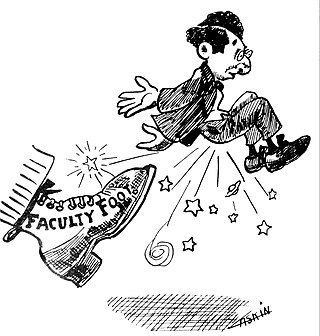Related Research Articles
Labour laws, labour code or employment laws are those that mediate the relationship between workers, employing entities, trade unions, and the government. Collective labour law relates to the tripartite relationship between employee, employer, and union.
In United States labor law, a hostile work environment exists when one's behavior within a workplace creates an environment that is difficult or uncomfortable for another person to work in, due to illegal discrimination. However, a working environment that is unpleasant and frightening for the victim due to sexual advances that have been denied by the victim, is what constitutes hostile work environment sexual harassment. Common complaints in sexual harassment lawsuits include fondling, suggestive remarks, sexually-suggestive photos displayed in the workplace, use of sexual language, or off-color jokes. Small matters, annoyances, and isolated incidents are usually not considered to be statutory violations of the discrimination laws. For a violation to impose liability, the conduct must create a work environment that would be intimidating, hostile, or offensive to a reasonable person. An employer can be held liable for failing to prevent these workplace conditions, unless it can prove that it attempted to prevent the harassment and that the employee failed to take advantage of existing harassment counter-measures or tools provided by the employer.

Sexual harassment is a type of harassment involving the use of explicit or implicit sexual overtones, including the unwelcome and inappropriate promises of rewards in exchange for sexual favors. Sexual harassment can be physical and/or verbal. Sexual harassment includes a range of actions from verbal transgressions to sexual abuse or assault. Harassment can occur in many different social settings such as the workplace, the home, school, or religious institutions. Harassers or victims can be of any gender.
Industrial relations or employment relations is the multidisciplinary academic field that studies the employment relationship; that is, the complex interrelations between employers and employees, labor/trade unions, employer organizations, and the state.
Employment is a relationship between two parties regulating the provision of paid labour services. Usually based on a contract, one party, the employer, which might be a corporation, a not-for-profit organization, a co-operative, or any other entity, pays the other, the employee, in return for carrying out assigned work. Employees work in return for wages, which can be paid on the basis of an hourly rate, by piecework or an annual salary, depending on the type of work an employee does, the prevailing conditions of the sector and the bargaining power between the parties. Employees in some sectors may receive gratuities, bonus payments or stock options. In some types of employment, employees may receive benefits in addition to payment. Benefits may include health insurance, housing, disability insurance. Employment is typically governed by employment laws, organisation or legal contracts.

School discipline relates to actions taken by teachers or school organizations toward students when their behavior disrupts the ongoing educational activity or breaks a rule created by the school. Discipline can guide the children's behavior or set limits to help them learn to take better care of themselves, other people and the world around them.
The merit system is the process of promoting and hiring government employees based on their ability to perform a job, rather than on their political connections. It is the opposite of the spoils system.

Termination of employment or separation of employment is an employee's departure from a job and the end of an employee's duration with an employer. Termination may be voluntary on the employee's part (resignation), or it may be at the hands of the employer, often in the form of dismissal (firing) or a layoff. Dismissal or firing is usually thought to be the employee's fault, whereas a layoff is generally done for business reasons outside the employee's performance.

Dismissal is the termination of employment by an employer against the will of the employee. Though such a decision can be made by an employer for a variety of reasons, ranging from an economic downturn to performance-related problems on the part of the employee, being fired has a strong stigma in some cultures.
Progressive discipline is a system of discipline where the penalties increase upon repeat occurrences.
A demotion is a compulsory reduction in an employee's rank or job title within the organizational hierarchy of a company, public service department, or other body. A demotion may also lead to the loss of other privileges associated with a more senior rank and/or a reduction in salary or benefits. An employee may be demoted for violating the rules of the organization by a behavior such as excessive lateness, misconduct, or negligence. In some cases, an employee may be demoted as an alternative to being laid off, if the employee has poor job performance or if the company is facing a financial crisis. A move to a position at the same rank or level elsewhere in the organization is called a lateral move or deployment. A voluntary move to a lower level is also a deployment as it is not a compulsory reduction in level. Demotion is often misinterpreted simply as the opposite of a promotion. However, it is only one means of undergoing a reduction in work level.
Just cause is a common standard in employment law, as a form of job security. When a person is terminated for just cause, it means that they have been terminated for misconduct, or another sufficient reason. A person terminated for just cause is generally not entitled to notice severance, nor unemployment benefits depending on local laws.

The Rehabilitation Act of 1973 is a United States federal law, codified at 29 U.S.C. § 701 et seq. The principal sponsor of the bill was Rep. John Brademas (D-IN-3). The Rehabilitation Act of 1973 replaces preexisting laws to extend and revise the authorization of grants to States for vocational rehabilitation services, with special emphasis on services to those with the most severe disabilities, to expand special Federal responsibilities and research and training programs with respect to individuals with disabilities, to establish special responsibilities in the Secretary of Health, Education, and Welfare for coordination of all programs with respect to individuals with disabilities within the Department of Health, Education, and Welfare, and for other purposes. It created the Rehabilitation Services Administration.
Misconduct is wrongful, improper, or unlawful conduct motivated by premeditated or intentional purpose or by obstinate indifference to the consequences of one's acts. It is an act which is forbidden or a failure to do that which is required. Misconduct may involve harm to another person's health or well-being.
Misconduct is of particular importance in professional settings, in the workplace and various institutions. Two categories of misconduct are sexual misconduct and official misconduct. In connection with school discipline, "misconduct" is generally understood to be student behavior that is unacceptable to school officials but does not violate criminal statutes, including absenteeism, tardiness, bullying, and inappropriate language. Misconduct in the workplace generally falls under two categories. Minor misconduct is seen as unacceptable but is not a criminal offense. Gross misconduct can lead to immediate dismissal because it is serious enough and possibly criminal, e.g. stealing or sexual harassment.
The Minister responsible for the Public Service Commission is the Manitoba cabinet minister responsible for the Public Service.
Suspension is paid or unpaid time away from the workplace as ordered by the employer in order for a workplace investigation to take place, or as a disciplinary measure for infractions of company policy. It is also a temporary exclusion from school.
A workplace is a location where someone works, for their employer or themselves, a place of employment. Such a place can range from a home office to a large office building or factory. For industrialized societies, the workplace is one of the most important social spaces other than the home, constituting "a central concept for several entities: the worker and [their] family, the employing organization, the customers of the organization, and the society as a whole". The development of new communication technologies has led to the development of the virtual workplace and remote work.

The California State Personnel Board (SPB), one of California's constitutional offices, is one of the California agencies responsible for administration of the merit-based civil service employment system for California state agencies, the other being the California Department of Human Resources.
South African labour law regulates the relationship between employers, employees and trade unions in the Republic of South Africa.

The Office of Professional Responsibility (OPR) at the U.S. Internal Revenue Service (IRS) is responsible for all matters related to "tax practitioner" misconduct, discipline and practice before the IRS under 31 CFR Subtitle A, Part 10. A tax practitioner, sometimes referred to as a tax professional, is generally an attorney, CPA or enrolled agent.
References
- 1 2 3 Asa Smallidge Knowles (1977). "disciplinary probation". International encyclopedia of higher education . Vol. 1. Jossey-Bass. ISBN 978-0-87589-324-2.
- 1 2 Arthur R. Pell (2003). "Putting Employees on Probation". The Complete Idiot's Guide to Managing People. Complete Idiot's Guides (3rd ed.). Alpha Books. pp. 350. ISBN 978-1-59257-145-1. ISBN 159257145X.
- 1 2 Thomas Allan Brady and L. F. Snoxell (1965). Student discipline in higher education. Student personnel series. Vol. 5. American Personnel and Guidance Association. p. 6.
- ↑ Richard C. Grote (2006). Discipline without punishment (2nd ed.). AMACOM Div American Mgmt Assn. pp. 5–8. ISBN 978-0-8144-7330-6.